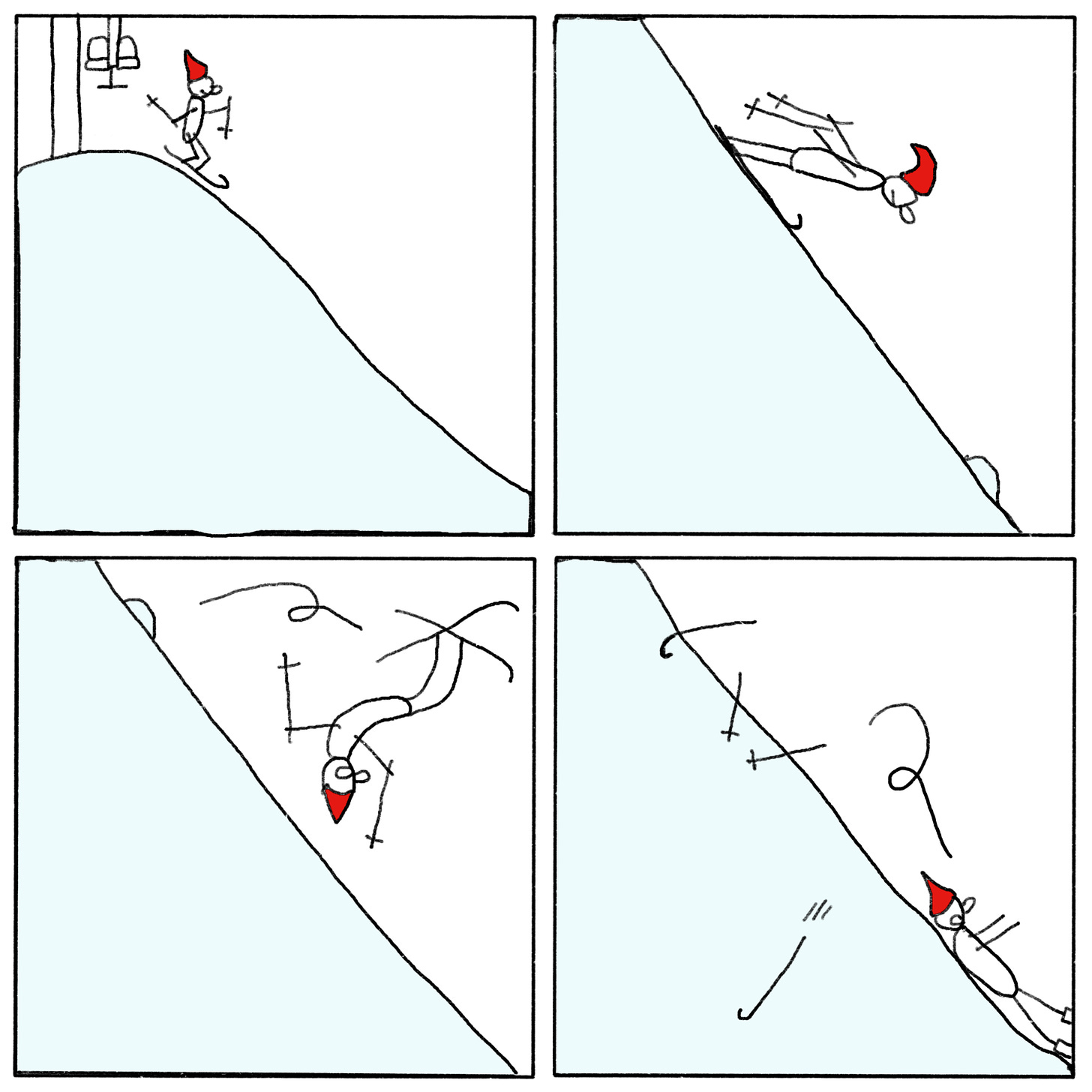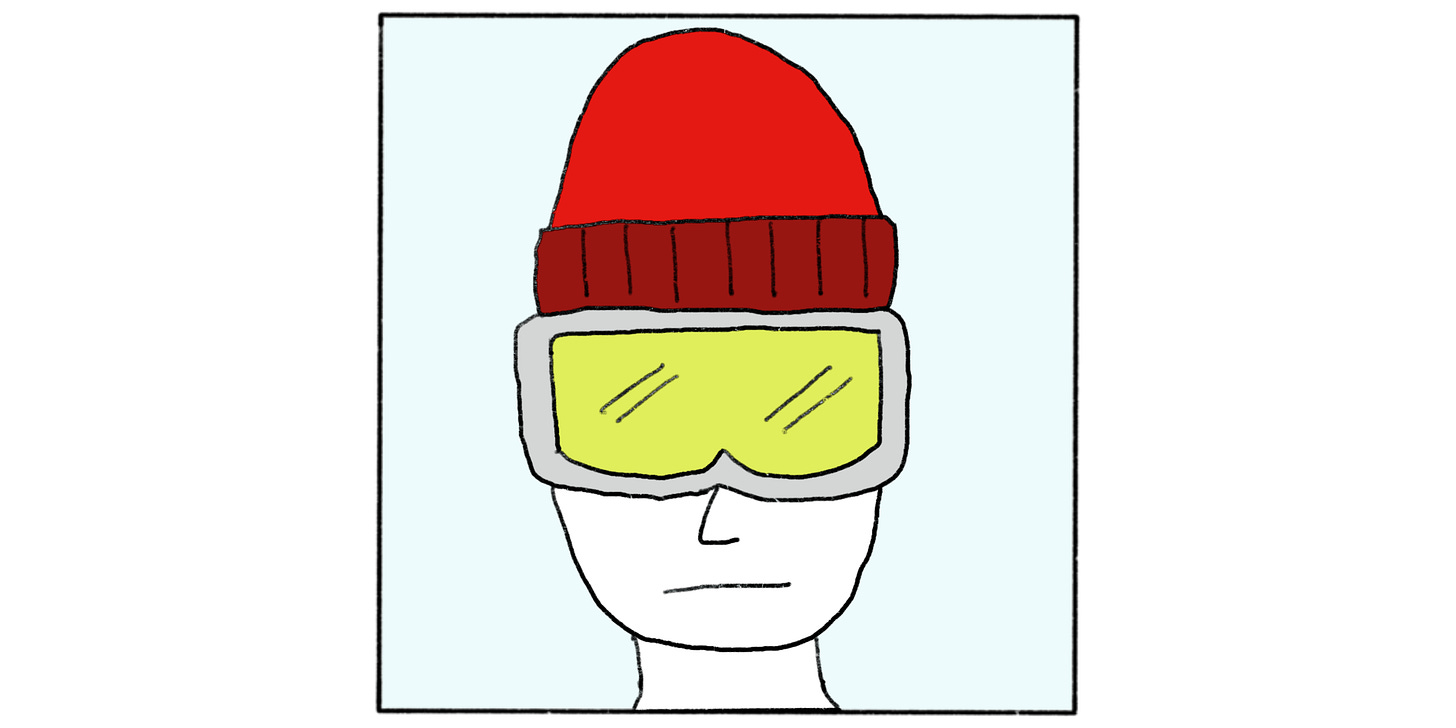05 May 2023
The Ski Lesson
Ski season is over in the Northwest, but I’m grateful for my experiences on a half-dozen mountains this winter. From the upper bowls of Whistler to the creaky Chair 2 at Alpental, I had a blast with friends and solo, in rain and hail and snow and shine, but one trip stands above the rest.
I was at Stevens Pass in late March and feeling good. A friend and I had completed a daring backcountry run through fresh powder on a bluebird day. While I loved the wildness of touring, I was itching to break my 50.3 mph speed record before the season’s end.
Speed Demon
At the start of the season, the enchanting views of snow-laden evergreens kept my phone zipped in my pocket. But, like everything in the past decade, skiing too became plagued by an app. This app, Slopes, tracks everything about a ski day—time downhill vs. on lifts, distance covered, speed, runs completed—and I became obsessed with it during mid-season.
I’d hurry to the lift after each run, wriggle from my gloves, and fish out my phone to inspect my speed. If the number wasn’t high enough, I’d spend the ride up scouring for a slope to barrel down. A demon was inside me, flooring the accelerator with its clawed foot.
This day was no different. Stevens had a steep, relatively smooth hill perfect for a speed run. When I got off the lift, I hurried past anyone in the way to reach the straightaway. As I bent my knees and tucked my poles, I shot downhill.

Catching my breath, I checked my legs and arms and miraculously found everything working. My wrists and ankles burned but were not broken, and the helmet had done its job. Then, a stranger was helping me up, checking if I was okay. Another stranger brought me a ski. A third carried my poles. Finally, a fourth stopped by to deliver my binding.
Usually, the boot disconnects from the binding, but I’d fallen so hard that the binding detached from my ski. Thanking the strangers, I half-walked, half-slid to the bottom of the hill with my gear. As I neared the bottom, a teenager ran up the mountain—in ski boots—to give me my unbound ski.
Vanity Metrics
Five people. Five strangers stopped on a moment’s notice to come to my aide, stopping their runs out of pure kindness. I had been so obsessed with the speed goal that I forwent safety and got myself into a dangerous situation. That selfish pursuit had inconvenienced others, disrupting their enjoyment.
How did a simple metric become so blinding?
My friend met me at the bottom and led me to the repair shop. We assumed the binding broke and we’d call it a day but figured an expert’s opinion couldn’t hurt. Sure enough, the man behind the counter showed me how to slide the binding in place. He explained this feature prevented snapped femurs, but the better solution was to loosen the boot binding. The week before, to increase my chances for speed and aggressive cutting, I had tightened the binding well above my capabilities.
Anything for speed.
Speaking of, I checked my app to see the last run’s top speed: 50.2 mph.

That night I lay awake, panged by guilt, not just for my selfish speed run but for a litany of similar behaviors. My desire to be the fastest of my friends caused me to abandon them for hours and ski alone on steeper runs. Outside of skiing, my obsession with personal goals made me emotionally unavailable to the people I love. I was over-indexing on vanity metrics.
Drive-Thru Penance
The following morning, my guilt remained. Mentally groggy and physically bruised from the tumble, I shuffled through the day, tormented by this abstract guilt. I needed some sort of penance to absolve me of this feeling.
Usually, when feeling like this, I resort to “muscly” solutions. For instance, I once found a tall hill on a stormy day and ran up and down without rain gear until I was soaked and breathless. Beyond Sisyphean efforts, I’d also create strict rules for myself, like sobriety or other unfitting punishments. Like my obsession with speed, I was equally obsessed with fast and straightforward penance. I longed for a spiritual drive-thru—pray and pay and get out.
But these acts of penance were no different than the vanity pursuits that inspired them. The work I needed to perform was much more challenging: changing myself.
I’m very goal-oriented, so I often chase things like newsletter subscribers, VO2 max, net worth, ski speed, and so on. If I were looking for a quick solution, I might flippantly say that all metrics are wrong and pursuing goals creates such character flaws. Let me be clear: There’s nothing wrong with metrics or goals. But when they become false idols that make us blind to the world around us, they cost us our better selves. The real tragedy of my incident was not the disruption I caused but that I rendered myself unable to help others.
The Spirit of Things
A few days later, a video emerged of a man saving a snowboarder’s life on Mount Baker. The rider was buried headfirst in a tree well when a passing skier quickly rushed to his aide—unearthing his face before he suffocated. It was an equally terrifying and inspiring story that depicted what skiing is all about.
Like all sports, skiing has an aspect of sportsmanship that is arguably more important than the activity itself. Sportsmanship is not playing by the letter of the law but a way of being that embodies a sport’s essence. By the letter, skiing is strapping sticks to your feet and sliding down a snowy mountain. By the spirit, skiing is enjoying the flow state and helping others stay safe in finding their own.
We should not lose touch with the spirit of what we’re doing. A job’s essence is to serve the needs of others, and friendship is to support the people we love. Metrics become vanity when they lose touch with that spirit.
So, as I watched that video and reflected on times when my vanity pursuits commandeered my spirit, I realized I couldn’t attain absolution in a drive-thru. Sometimes, the answer to spiritual pain is to live with the torment and let it serve as a reminder. I want mechanisms to solve my personality problems because I don’t trust myself to act per my desired character. But, to truly change, we must remain conscious of the person we wish to be.
And that’s hard work.